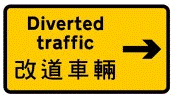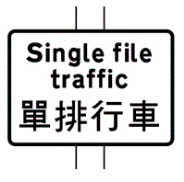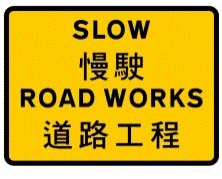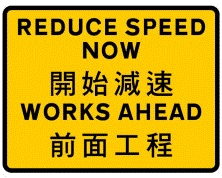Temporary signs
Temporary signs are used to give warning of temporary hazards, or information or guidance about temporary traffic arrangement. They can be regulatory, warning or informatory. Temporary signs are as important as permanent signs. You should look out for them even if you are on a familiar road. Temporary signs are usually mounted on portable stands but may also be found on posts like permanent signs. Some regulatory signs such as ʻStopʼ and ʻGoʼ may be manually operated.
Temporary signs can be used for temporary traffic arrangements for major events or if a section of road is closed because of an emergency or road works.
They can also be used for warning of temporary road conditions or for short-term traffic control by the police.
 |
 |
 |
 |
 |
 |
 |
 |
1.
Right lane closed ahead |
2.
Right lane closed ahead |
3.
Left lane only ahead |
4.
Left lane only ahead on two-way road |
5.
Road works ahead |
6.
Divert to another carriageway to right ahead
(direction may be reversed) |
7.
Keep right
( Keep left if symbol reversed ) |
8.
Vehicles may pass either side to reach same destination |
| (Red bars in signs 1 to 4 indicate that lanes are closed) |
|
 |
 |
 |
 |
 |
 |
 |
 |
9.
Road narrows on left ahead
(right if symbol reversed) |
10.
End of road works, used with Signs 1 to 5 |
11.
Used with Sign 5 to indicate line painting
(wording may be varied to suit nature of road works) |
12.
Temporary closure of lane or road |
13.
Temporary sharp deviation to left
(right if symbol reversed) |
14.
Manually operated 'Stop/Go' sign ahead |
15.
Manually operated temporary 'Stop' sign |
16.
Manually operated temporary 'Go' sign |
 |
 |
 |
 |
 |
 |
|
17.
Ramp or sudden change of road level ahead |
18.
Ramp or sudden change of road level |
19.
Temporary traffic cone |
20.
Temporary traffic cylinder |
21.
Temporary ʻNo parkingʼ sign |
22.
Traffic signals ahead |
Diversion signs guide you along an alternative route that will rejoin the normal route after passing the closed road or obstruction. Temporary direction signs may be used for temporary routes or for short-term events that likely attract much traffic. Diversion signs and temporary direction signs have a yellow background.
Sometimes a worded warning sign may be used for specific hazard when there is no suitable standard sign for use. The signs are usually of rectangular shape and have a red background.
Temporary road markings
Temporary road markings may also be used to delineate carriageway edges or to divide a carriageway into traffic lanes (see pages 124 to 127).
 |
 |
 |
 |
 |
 |
23.
Road ahead closed to vehicles |
24.
Road closed to vehicles |
25.
Temporary route for vehicles |
26.
Temporary route for pedestrians |
27.
Used with temporary traffic signals. Vehicles must not proceed beyond the sign when red light shows. |
28.
Temporary closure of pedestrian crossing |
 |
 |
 |
 |
 |
 |
 |
29.
Diversion ahead for all vehicles at distance shown |
30.
Temporary diversion for all vehicles |
31.
Temporary route for all diverted traffic |
32.
End of diversion |
33.
Slippery road ahead |
34.
Loose chippings ahead |
35.
Uneven road surface ahead |
 |
 |
 |
 |
 |
 |
 |
|
36.
Slow
(Sign used by police in emergency) |
37.
Warn of road surfacing works (wording may be varied to suit specific hazard) |
38.
Other danger ahead
(used with plate to describe the hazard) |
39.
Used with Sign 38
(wording may be varied) |
40.
Single file traffic ahead
(wording may be varied to 'Single track road') |
41.
Slow, road works |
42.
Reduce speed now, works ahead |
Temporary Signs and Road Markings